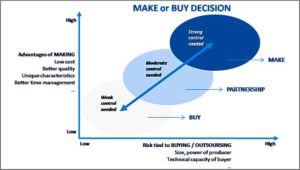DIY: 4 Things To Ask Yourself First

Welcome the third post in the Common Project Management Mistakes series! DIY: 4 Things To Ask Yourself First. If you haven’t been along for the ride so far, I have started listing all the mistakes you want to avoid as a business owner when it comes to your projects. I have over ten years in the field, and I am current on all the latest tips and tricks. I just thought you need to know some more things about navigating your projects. You know, to make things a little easier, and increase success. I have over ten years of Project Management experience, and I am current on all the latest tips and tricks in various methodologies to help you reach your strategical goals with less stress.
Let’s check out this awesome graphic from Cleverism, first. Don’t worry, we’re going to walk through exactly what this all means it in this post. I will be presenting from the MAKE OR BUY Decision on both perspectives. There’s only one aspect of this infographic that I will challenge, other than that, it’s spot on.


“I’ll do it myself, I got this!”
Let’s just be honest, for some people starting out in business ownership, all you had was yourself. You did it all! Marketing, accounting, *networking, advertising, THE ACTUAL WORK, state filings, etc… It’s easy to get caught up in volunteering your time (and paying yourself) for everything. There comes a point in time where you need to delegate, period. How do you decide?
DIY: 4 Things To Ask Yourself First
1. How much does your time cost?
No, really, how much does your time cost a customer per hour? Can you afford to take away an hour or two away from your billable work to create something “new” or provide that something “new” to a new prospect? I put quotes around “new” because my goal is to show you how to avoid recreating the wheel unless it’s a Tron-type wheel. I’d buy that. Maybe this isn’t a problem because all your clients are squared away, however, you may be attempting to learn a new skill/industry entirely for your new strategic goal. Learning that new skill could potentially take one, two, or more hours away from your customers on an indefinite DAILY basis! This may lead to you rushing through the work you already know for your clients in order to get more time to learn what you don’t know! Don’t be messy!
So let’s say your time is worth $200 per hour. Making something “new” may cost you $200 per hour! Why not just pay fivr.com $5-$10 to make your graphic and your ad. I know that is a low spectrum example, however, if you need to fill out a spreadsheet (i.e. expense receipts), you can go to Upwork.com and find a really good price ($6-7 an hour) on an administrative assistant that could do that for you. I’m a Project Manager, it’s my job how to know how to cut budget costs. These are low-level examples. It’s important to link these conceptual questions in an effective way when you move to the bigger picture. So, moving on…
2. What sacrifices/risks are in play to reach the goal?
To be honest, a lot of my best clients are members of families, multi-business platforms, pick-up teams, nonprofits, etc. If you get too involved in a project that requires too much time because you’re learning a new skill; those folks are losing your valued time, too! Sacrifice… everyone has to do it. Boundaries… everyone has to make them.
Are you willing to sacrifice time with business/family/partnerships/team/passions to launch a new “thing” that is within the boundaries of your budget to buy? That was a loaded question. I’ll let you sit with that a minute. This is a question 6,7, and 10 figure people answer every day! Think about your regular television show where the millionaire CEO has a driver so that they can conduct other business on the way to the meeting location. Money on the go! It’s good to learn these lessons now if you haven’t already. You’re going to be more successful if you subscribe to this blog, flat out!
You will learn to make more robust decisions based on this principle as your business grows. This is a continuous lesson. I’ve been taking notes about what success looks like after 5 pm and on weekends. That’s when most of my project management meetings occur because I have a contract that takes up all the business hours of the day (I love it). I am told exactly what commitment my clients have to work around when I propose a time and date to meet with my clients. As a Project Manager, I even take notes on these things to create a better client experience. My clients have all kinds of commitments! Don’t let learning a new thing take away from the commitments that matter the most to your clients/customers. Hire a pro to do the “new” thing in less than half the time and reach your strategic goal; only if it can be provided more efficiently.
3. How much does the service/product suppliers time cost?
Don’t forget meetings.
One of the things I learned from pricing is thinking about the cost of a meeting. When I walk into a meeting, I plan on getting, at the very least, some key information that creates action items. The thing is, when you organize a meeting, you must remain cognizant of how much that meeting cost on an individual basis. Remember, in this example your time costs $200 per hour. Are you getting the value of your time back from meetings that may be scheduled with the provider? Will the result of a meeting with a supplier prove to be profitable, refund you for your time, and meet your goals?
Whichever supplier you choose to meet with, make sure that they are proving their value. I suggest letting the introductions pass and asking, “What’s in it for my business?” I call this the pressure button. The should be prepared to answer this. Don’t let them give you the website answer you already saw because you researched them either. Make a list of expectations before attending a demo or informational meeting. Believe me, you will know if they are the one when they answer that question. Ask questions directly related to your scope requirements. If you know you want in an automation system that integrates with 4 specific platforms, make sure to address that concern.
Going back to a make-or-buy decision, research on industry prices will be key. When developing your budget it is key to research standard market pricing, no matter the variance. You will want to do this for your “I’ll do it myself” and your “I’ll buy” decision. This will help you understand the ballpark to plan the funds or time should you choose to go it alone. We have really fun formulas in project management to help you understand fair pricing. It works because it sets realistic expectations for budgeting purposes. Make sure you are not basing your budget on numbers that have not been investigated. This is the quickest way to lose interest from investors. Just because you don’t have it doesn’t mean someone won’t help you. They know what the numbers should look like. When they ask you where you got your pricing from and you have no business point of reference, they will run (and they should). If you reference a business, they may work to find a better price with their connections; it encourages them to do their own research if they believe in your project enough. They may have the reach that you don’t.
4. How much power do you have with the supplier?
It’s important to be able to support a supplier, however, you want to be able to choose the level of control you have over your project. The scale goes from strong to weak in the matrix of client/supplier authority mix. Here are some questions you want to address with them. If you need help navigating this conversation with your supplier, contact me at services@goalgetterpm.com. I WILL HELP YOU!
Here are some things you will want to ask yourself, though:
- How much power do I have with the supplier?
- How many requirements can they fulfill to reach my goal?
- What type of contract does the supplier have to provide the service you need?
- Does your budget have room to buy that service?
If you remember my post about why a super-hero would hire Goal-Getter PM, you would know that I love going undercover to find the answers you need unrelated to your interest my services. If you need me to check a service out on your behalf, again, the email address is services@goalgetterpm.com.
Conclusion:
You really need a team for projects if you plan to succeed. The point is to delegate tasks to skilled and qualified/expert resources. This is where I would like to challenge the infographic presented by Cleverism above. Better quality comes with better skills. Ummm, no, you decide what you need and give it back to your suppliers to provide. Choosing the right professional will lead to better quality. Have you ever heard of the term “Time-Broke”? Well, making sure you have resources allows you the time to continue your business and commitments without going broke during a project. Do you need to understand what the end result should be? Yes. Do you need to spend the time doing the tasks yourself stagnating your business? No! Delegate, always! There are tons of resources that match your budget. Don’t go it alone!
But…
Here’s something I invested in and learned to make.
Want one? Contact me at services@goalgetterpm.com
Goal-Getter PM Alert: Networking
*So about networking… let me introduce you to PeekaMeet!

Image Sources:
Reprise Software: http://www.reprisesoftware.com/blog/wp-content/uploads/2016/03/MakeOrBuy.png
Cleverism: https://www.cleverism.com/wp-content/uploads/2014/12/Make-or-Buy1-e1417976993729.png
Production of Goal Getter Project Management – www.goalgetterpm.com
© Brianna Sudduth, Goal-Getter Project Management, and GoalGetterPM.com, 2017. Unauthorized use and/or duplication of this material without express and written permission from this site’s author and/or owner is strictly prohibited. Excerpts and links may be used, provided that full and clear credit is given to Brianna Sudduth and GoalGetterPM.com with appropriate and specific direction to the original content.
This work is licensed under a Creative Commons Attribution-NoDerivatives 4.0 International License.



ปั้มไลค์
July 7, 2020Like!! I blog frequently and I really thank you for your content. The article has truly peaked my interest.